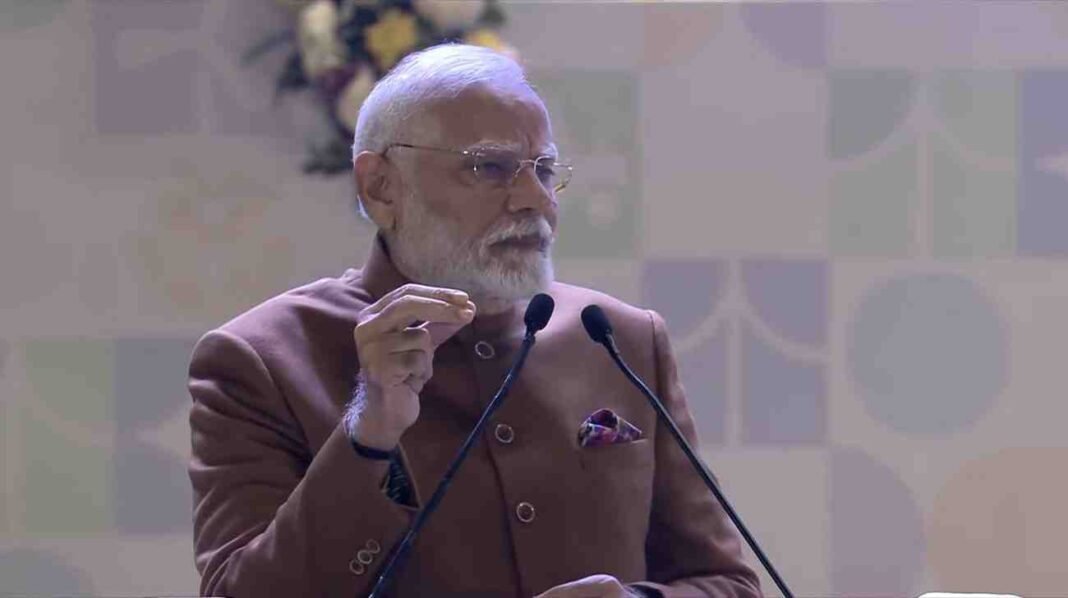Prime Minister Narendra Modi on Saturday inaugurated the Grameen Bharat Mahotsav at Bharat Mandapam, New Delhi, embarking on a new journey in India’s rural development. The event, devoted to promoting the nation’s progress and to highlighting the transformative changes unfolding in rural India.
PM Modi emphasized the importance of harmony and love in village identity, urging citizens to thwart conspiracies seeking to spread hatred and weaken social bonds in the name of caste, and instead preserve their shared culture. He said, “some people are trying to spread poison in society in the name of caste and weaken the social fabric.”
PM Modi stressed the significant achievement rural India has made under the leadership of his government, drawing attention to the positive impact of various policies aimed at empowering villages and uplifting rural communities. He shared his personal bond with rural India, remembering his childhood in a small town and later experiences that shaped his understanding of the challenges and potential of the village society.
“Those of us who grew up in rural areas understand the capabilities and perseverance of India’s villages. Despite their vast potential, they have long struggled with basic needs such as access to markets, capital, and essential services,” the Prime Minister remarked.
He noted several government initiatives that have been playing a critical role in enhancing the lives of rural citizens, such as the Swachh Bharat Mission, PM Awas Yojana, and the Jal Jeevan Mission. These schemes, he highlighted, have provided basic infrastructure like toilets, homes, and clean drinking water to millions of families. Additionally, the overreach of healthcare services through Ayushman Arogya campaigns and telemedicine has assured that rural areas are no longer overlooked when it comes to health services.
The key highlight of the address was PM Modi’s declaration of the Cabinet’s approval to extend the PM Fasal Bima Yojana, a scheme aimed at supporting farmers during crop failure. He also assured farmers that the government would carry on to provide subsidies to protect them from global fertilizer price hikes.
The Prime Minister spoke about the government’s emphasis on economic policies formulated to strengthen the rural economy, stressing the significance of self-sufficiency and reducing migration. Over the past decade, nearly ₹3 lakh crore has been distributed through the PM Kisan Samman Nidhi to aid farmers, and agricultural loans have increased by more than three times.
The role of cooperatives in rural India’s transformation was also underscored, with the creation of the Ministry of Cooperation in 2021. PM Modi pointed out the growing importance of cooperatives in sectors like agriculture, milk production, and handicrafts, which provide support to rural incomes.
In an effort to empower rural women, the Prime Minister also mentioned the government’s initiatives like “Sakhi” and “Bima Sakhi,” which have empowered women to redefine their role in the rural economy. He further disclosed that over 1.15 crore women are now earning over ₹1 lakh annually, and the government aims to raise this number to 3 crore in the future.
Contemplating the nation’s progress, PM Modi admitted that the gap between urban and rural India is receding, with rural consumption tripled since 2011. “For the first time since independence, rural people are spending less than half of their income on food, showcasing that they are investing in enhancing their quality of life,” he added.
The Prime Minister also directed focus on the successful implementation of rural infrastructure development projects such as the PM Gram Sadak Yojana, which has seen the construction of over 4 lakh kilometers of rural roads in the past 10 years. Moreover, digital infrastructure has been a key focus, with over 94% of rural households now having access to mobile services and online banking.
The Prime Minister concluded by praisipraising the National Bankfor Agriculture and Rural Development (NABARD) ‘s crucial role in rural development, specifically in supporting initiatives like self-help groups, the Kisan Credit Card, and Farmer Producer Organizations (FPOs). He encouraged further cooperation to ensure that farmers receive just prices for their crops and stressed the importance of encouraging natural farming to make rural regions more sustainable.
“Together, we will continue to improve the rural economy, focusing on irrigation, rural enterprises, and skill development for the future. Our aim is to make villages self-sustained and economically prosperous for generations to come,” said PM Modi.
The Grameen Bharat Mahotsav is set to become a platform for showcasing Rural India’s entrepreneurial spirit and cultural heritage. The Mahotsav will be held from 4th to 9th January with the theme ‘Building a Resilient Rural India for a Viksit Bharat 2047.’
The Mahotsav, through various discussions, workshops, and masterclasses, aims to improve rural infrastructure, create self-reliant economies, and foster innovation within rural communities. Its objectives include promoting economic stability and financial security among rural populations, with a special focus on North-East India, by addressing financial inclusion and supporting sustainable agricultural practices.
The Mahotsav will primarily focus on empowering rural women through entrepreneurship. It aims to bring together government officials, thought leaders, rural entrepreneurs, artisans, and stakeholders from diverse sectors. This collective effort will build a roadmap for collaborative rural transformation.
The event will facilitate discussions on leveraging technology and innovative practices to enhance rural livelihoods. Additionally, it will showcase India’s rich cultural heritage through vibrant performances and exhibitions, celebrating the country’s diversity and talent.








